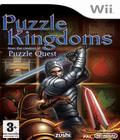In 2007, D3 introduced Puzzle Quest: Challenge of the Warlords to the masses. This cult classic combined the puzzle gameplay of Bejeweled with the character-building elements and themes from fantasy RPGs. The game met critical success and spawned a recent sequel, Puzzle Quest: Galactrix. The developers have made another attempt in re-creating the addictive gameplay of the Puzzle Quest series, and the results is Puzzle Kingdoms for the Wii.
It's prominently displayed on the box cover that Puzzle Kingdoms is from the developers of the original Puzzle Quest, and you can see that it borrows many elements from that title. Both games take an unusual approach to the puzzle genre by utilizing heavy story elements. Like the original Puzzle Quest, this title takes place in a fantasy setting where you control an individual warlord who must protect his kingdom from rival kingdoms. You must also expand control of your land holdings through warfare. Unlike Puzzle Quest, where you select a class for your hero, your character in Puzzle Kingdoms is essentially the commander of an army. As you progress through the game, more commanders will ally themselves with you, and you have the option to switch commanders between battles or to replace a commander who has fallen in battle.
As you progress, you'll need to recruit new troops for your army. You can have up to four soldiers of any variety, and it's typically better to have a diverse group, which I'll explain later. Soldiers are important because they determine how well and how often you can fight, and they're the keys to winning or losing battles. You can purchase more troops in friendly areas and recruit new troops at taverns, all of which appear on the world map. Additionally, you'll find dungeons that contain treasure and spells, and shrines help to advance the story.
For the most part, you'll have to fight in every area that isn't a friendly town, and battles are the heart and soul of the title. It's here that you'll see the familiar colored blocks of Puzzle Quest fame, with some new additions. Your army takes up the left side of the screen, with your enemy taking up the right. In the middle is a large grid with colored blocks, and you take turns shifting a single row or column. Like Puzzle Quest, the objective is to match three or more of the same colored blocks together, but they don't have to necessarily be in a straight column or row; they just have to be adjacent to one another, such as a simple "L" shape. Of course, the nearly non-existent tutorial only tells you to match up three blocks and nothing more, so I spent a good hour trying to figure out how and why my opponent was gaining so many more matches. It also took a few moves before I realized I was moving the whole row instead of the individual block, which I've been accustomed to with games like Tetris Attack.
Puzzle Kingdoms controls exclusively with just the Wii Remote pointer and the A button. To slide a row or column, you click on your target and make the sliding motion in the direction you want to go. The motion controls worked adequately with the specific motions I made. The B button is used for scrolling through your spells, which can be activated when a certain number of matches have been made. When activated, the spells require a waggle motion from the Wiimote, and their effects vary from buffing your units, to directly attacking your opponent's units, to destroying specific colored blocks on the grid.
Attacking is much like casting spells. It's wise to have a diverse army because each unit has a specific requirement in order to attack. For example, a swordsman may need three white block matches before he can attack, while a peasant may need two green block matches. Obviously, the specific blocks you need won't be readily available to you, so it's good to have alternative colors at your disposal. Once the requirement for an attack is achieved, an attack icon will appear at the top of the screen, and on your next turn, you can select it, and waggle the Wiimote to attack your opponent. Each unit has a number of attack and defense points. When you attack a unit, you're hitting its defense points, and if your attack meets or beats the unit's defense, it'll die. You continue this process until all of your opponent's units are defeated, at which point you win the battle. Upon victory, you'll receive gold to purchase more troops and experience points to level up and improve your attributes.
Although it's not exactly surprising for puzzle games, the computer AI takes a lot of cheap shots, so you'll have to plan your combat actions much more precisely. If you try to set up the blocks in your favor, your AI opponent will likely exploit your strategy and use it against you. It also doesn't help that the opponent knows the game better than you and will pull off tricks you couldn't imagine doing. Along the borders of the grid, there are colored icons much like the ones found within the blocks. When selected, these icons will shift forward and bump out the block on the far opposite end of the grid. This is a great strategy for getting in an extra match, but it wasn't until the computer used it against me and cleared out half of the grid that it left me awestruck … and a little bitter. Like all puzzle games, this will test your skill and nerves. The main campaign has several dozen missions to complete, which will keep you busy for a good period of time.
In addition to the main game, there is two-player multiplayer, which is a staple of the genre. Players can compete against each other using the mechanics found in the main game. Given a random assortment of units, players will be able to play without the menacing strategies of an AI opponent. There are also mini-games that have players clear the grid of blocks within a time limit. These blocks disappear when matched, whereas an infinite supply of blocks replaces the matched blocks in the campaign mode.
Graphically, Puzzle Kingdoms is no more impressive than a game found on the SNES. While the graphics aren't meant to be a huge factor in this game style, even the title's non-puzzle elements aren't that remarkable. The world map is large and so zoomed out that you can't make out any detailed objects, aside from colored environments like deserts, forests and mountains. Static character portraits and background images dominate the story segments, which are decent enough, but those sections typically detract from the gameplay.
The audio for the game consists of typical medieval-fantasy music and is similar to the graphics in that there's nothing to write home about. A choir echoes during key moments in the game, and the panpipe-lute ensemble chimes in for just about everything else. Aside from the introductory voice-over when you start the campaign, there isn't any spoken dialogue in the title. In battle, you'll hear grunts of pain when you're attacked and cheers of victory when you defeat the enemy. This also complemented with clashing metal to imitate the intense noises of a swordfight. The presentation isn't amazing, but for a puzzle game, it doesn't really need to be.
Puzzle Kingdoms will appeal to fans of the Puzzle Quest games, though it doesn't really add anything new to the franchise and isn't terribly impressive. It's a solid puzzle game, and I recommend it to fans of the genre, though new players may end up being more puzzled by the gameplay rather than the actual puzzles.
Score: 7.0/10
More articles about Puzzle Kingdoms










 Zoo Games' Puzzle Kingdoms is a new interpretation of the deep puzzle genre that raises the level of play beyond the standards of casual gaming by integrating a fantasy storyline with engaging strategy and tactical puzzle gameplay.
Zoo Games' Puzzle Kingdoms is a new interpretation of the deep puzzle genre that raises the level of play beyond the standards of casual gaming by integrating a fantasy storyline with engaging strategy and tactical puzzle gameplay.















